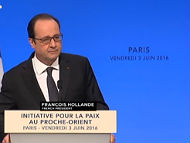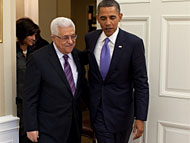 The French are at it again. Nearly one hundred years to the day after France concluded the notorious Sykes-Picot agreement with the Brits, and Paris has once more come to the fore in the Middle East by convening an international conference to deal with the Israeli- Palestinian dispute.
The French are at it again. Nearly one hundred years to the day after France concluded the notorious Sykes-Picot agreement with the Brits, and Paris has once more come to the fore in the Middle East by convening an international conference to deal with the Israeli- Palestinian dispute.
Back in the closing days of World War I, France and Britain colluded to divvy up the territory of the Turkish Ottoman Empire, which wound up on the losing side. Francois Picot of France and Mark Sykes of Britain sat down at a map of the Middle East with two sharp pencils, a ruler and an eraser. When they were done, they had drawn a new map of the region, and, ‘Bob’s your uncle’.
Iraq, Transjordan and Palestine went to Britain, and Syria and Lebanon to France. And although not actually included in their real estate deal, Egypt would become a British sphere of influence, while France got the Maghreb – Algeria, Morocco, Tunisia and Libya. And to make certain this scheme would endure, the two imperial powers saw to it that paternalistic regimes would rule the natives.
Now a century later, Sykes-Picot has ended up in the proverbial dustbin of history, but the outcome has not. Bloodshed and uncertainty run rife from one end of the region to the other. Syria no longer exists as a viable state, and Iraq is also rent by internal turmoil. The French role is most notable perhaps in Algeria, where they perpetrated some of the worst atrocities since the Nazi war crimes of World War II.
Today France and Britain, to a far less extent, are reaping Islamist terrorism that can be traced back to Sykes-Picot. In fact, the US has warned its citizens to steer clear of France this summer, which will host the Euro Soccer tournament. Daesh still has its sights set on Paris after the recent terror attacks. The Islamist band of sadists, which is obsessed with ways of torturing other Muslims to death, has announced that it is wreaking revenge for Sykes-Picot.
The Yanks were relatively latecomers and focused primarily on guaranteeing oil supplies from Saudi Arabia as it proceeded to muscle in on Britain and France. And now that America is no longer dependent on Saudi oil, the Arabs feel Washington has pivoted toward Tehran. The Obama policy, as exposed by Ben Rhodes, is aimed at mollifying the Ayatollahs into suspending their nuclear weapons program in the near future. This strategic shift remains in serious doubt. Case in point: the Iranians flagrantly test launch their ballistic missiles designed to deliver nuclear warheads.
Having noted all this, one would think that French President Francois Hollande would have enough on his plate to keep him very busy at home. But on the other hand, maybe he is trying to curry favor with the Arabs. International conferences and the slanted UN are perceived, and rightly so, as ganging up on outnumbered Israel. And for this reason, Prime Minister Netanyahu will not be attending the Paris conference. On the other hand, Bibi has offered to meet Palestinian President Mahmoud Abbas anywhere, even in Ramallah. Abbas has refused.
Consider this: Israel has two full-fledged peace treaties – first Egypt and then Jordan. These historic accords were signed after exhaustive direct talks between Israeli prime ministers and the leaders of Egypt and Jordan, combined with a massive input by the US. Even the first Oslo accord with the Palestinians was forged in direct negotiations. How could it be otherwise if the outcome could put Israel’s very survival on the line? Despite the fact that Secretary of State John Kerry will go to Paris, Washington is lukewarm about its prospects as is British Prime Minister David Cameron. But should Bibi have at least made the trip and put his case before representatives of the 21 states? The PM decided he might have bigger fish to fry at this juncture of Middle East history.
Is a new Middle East in the offing?
There are numerous signs it is. Not only that – Israel may have a very key role. The Sunni Arab world of Egypt, Saudi Arabia, Jordan and the Gulf States believe that the Obama administration has tilted toward their most dangerous enemy, which is the non-Arab Iran. Moreover, Iran is Shiite Muslim, an anathema to Sunni Islam. Recently this smoldering feud flared into flames when Riyadh executed a popular Shiite cleric who was accused of incitement. A mob in Tehran then ransacked the Saudi embassy. Riyadh severed diplomatic ties. The background to this chain of events was Iran’s support for Houthi rebels in Yemen, Saudi Arabia’s backyard, and where Riyadh supports the regime with troops and military hardware.
Nearly all the Gulf States feel more threatened than ever by Iran. Cairo is also at odds with Iran, which it has accused of subversive activity. The Obama administration actually openly supported the rise to power of former President Mohammed Morsi of the fanatical Muslim Brotherhood. The current President Abdel Fattah al Sisi feels Obama is still turning him a cold shoulder even though he is an ally of America who will guarantee the peace treaty with Israel. Now the Muslim Brotherhood has apparently teamed up with Hamas in an effort to topple the government and install what – a radical Islamist regime that will abrogate the peace accord with Israel?
First time around, Obama officials went off the rails by acting as cheerleaders for the Muslim Brotherhood. At present, Jerusalem and Cairo are co-operating in combating Daesh terrorists who are now operating out of Egyptian controlled Sinai and pose a threat not only to Egypt but also Israel. In a live TV address, President al Sisi described the Israeli-Egyptian peace treaty in glowing terms, saying it should set an example for an Israeli-Palestinian peace treaty:
‘History will write a new page that will be no less and might even be more of an achievement than the signing of the peace treaty between Egypt and Israel 40 years ago’.
Jerusalem is also known to be conducting quiet diplomacy with Riyadh, and the Hashemite Kingdom of Jordan has owed its survival to Israel at least once in the past. It may still be today with Daesh knocking at the door.
But not only the Arab states fear an ascendant Iran that has now been bolstered economically while leaving nearly all its nuclear weapons facilities in place. Turkey is also eager to restore relations with Israel. News reports predict that Jerusalem and Ankara may announce a breakthrough in the near future. All these factors are separate pieces in a Middle East puzzle that may be joined to form a new alignment to confront the main threats of Iran and Daesh. It would appear the Palestinian question is not uppermost in the minds of Israel’s neighbors these days.
Ironically, Arab countries have viewed Israel’s military power as a threat, but now in light of the real and present dangers posed by Iran and Daesh, they now perceive the Jewish state as a valued asset.




